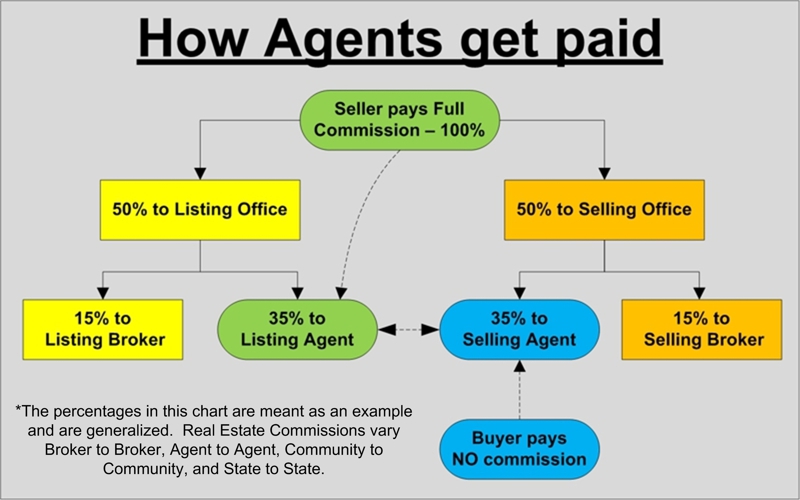
It can be a very complicated process to purchase a home. You will need to complete a lot more paperwork. A good listing agent is a huge help in navigating this process and avoiding the pitfalls. They are also able to provide valuable insights about the area and the market, making it easier to sell your home at the best possible price.
A listing agent can represent both the seller and buyer. This is called dual agent. Dual agency can be a cost-saving measure that requires the buyer to pay a commission. However, this can lead to buyers being turned away and the home staying on the market for a longer time.
A good agent for listing will perform a market analysis and suggest a listing price that meets current market conditions. A good price will increase your chances of selling your home quickly and maximize your profits. A competitive price can help you avoid "sellers market" and keep the home on the market.

A good agent can help you screen potential buyers. They are able to tell you which homes are worth purchasing and which ones are not. They can also help you get a faster closing date. This is a great deal if your goal is to quickly sell your home. They can help find you a great mortgage pre-approval. They can arrange tours for potential buyers to see your house.
Great agents will take care of all the above and answer any questions. They will be able to recommend the best marketing strategies for you to attract buyers and to sell your house at the highest price. They can also provide you with advice on how to stage your home and what repairs to make to maximize its potential. If necessary, they can arrange professional photography or coordinate open houses.
A great agent will be familiar with the local housing market, MLS and the current competition. They can tell you the best way to prepare your house for sale and the ways to avoid potential pitfalls. They can also provide advice on how to price your house, which is essential in today’s market.
A listing agent may not be necessary for you if your home is in a rural area or you have been away from the market for some time. However, if you do decide to hire one, do your homework before you sign on the dotted line. Take a look at reviews and track records, and get recommendations from relatives and friends.

It is crucial to choose a top-rated listing agent when selling your home. You can avoid losing out on a deal. It will also help to ensure a smooth, stress-free closing. The listing agent will be your main point of contact throughout this entire process. They are your key to a successful home-selling journey.
A good listing agent can also give you tips on how to price your home, as well as what to expect in the negotiation process. They can also advise you on how to stage your home, and can suggest easy repairs that can increase your home's value.
FAQ
How do I repair my roof
Roofs can leak due to age, wear, improper maintenance, or weather issues. Roofing contractors can help with minor repairs and replacements. Get in touch with us to learn more.
Do I need flood insurance?
Flood Insurance covers flooding-related damages. Flood insurance helps protect your belongings, and your mortgage payments. Find out more about flood insurance.
What are the three most important factors when buying a house?
When buying any type or home, the three most important factors are price, location, and size. Location refers the area you desire to live. Price is the price you're willing pay for the property. Size is the amount of space you require.
How much money can I get to buy my house?
The number of days your home has been on market and its condition can have an impact on how much it sells. Zillow.com says that the average selling cost for a US house is $203,000 This
What amount should I save to buy a house?
It all depends on how many years you plan to remain there. If you want to stay for at least five years, you must start saving now. If you plan to move in two years, you don't need to worry as much.
What should I consider when investing my money in real estate
First, ensure that you have enough cash to invest in real property. If you don't have any money saved up for this purpose, you need to borrow from a bank or other financial institution. It is also important to ensure that you do not get into debt. You may find yourself in defaulting on your loan.
It is also important to know how much money you can afford each month for an investment property. This amount must include all expenses associated with owning the property such as mortgage payments, insurance, maintenance, and taxes.
You must also ensure that your investment property is secure. It would be a good idea to live somewhere else while looking for properties.
Statistics
- Based on your credit scores and other financial details, your lender offers you a 3.5% interest rate on loan. (investopedia.com)
- 10 years ago, homeownership was nearly 70%. (fortunebuilders.com)
- The FHA sets its desirable debt-to-income ratio at 43%. (fortunebuilders.com)
- When it came to buying a home in 2015, experts predicted that mortgage rates would surpass five percent, yet interest rates remained below four percent. (fortunebuilders.com)
- This means that all of your housing-related expenses each month do not exceed 43% of your monthly income. (fortunebuilders.com)
External Links
How To
How to manage a rental property
Although renting your home is a great way of making extra money, there are many things you should consider before you make a decision. These tips will help you manage your rental property and show you the things to consider before renting your home.
Here's how to rent your home.
-
What should I consider first? Take a look at your financial situation before you decide whether you want to rent your house. If you have outstanding debts like credit card bills or mortgage payment, you may find it difficult to pay someone else to stay in your home while that you're gone. Your budget should be reviewed - you may not have enough money to cover your monthly expenses like rent, utilities, insurance, and so on. You might find it not worth it.
-
What is the cost of renting my house? It is possible to charge a higher price for renting your house if you consider many factors. These factors include the location, size and condition of your home, as well as season. Prices vary depending on where you live so it's important that you don't expect the same rates everywhere. Rightmove has found that the average rent price for a London one-bedroom apartment is PS1,400 per mo. This means that if you rent out your entire home, you'd earn around PS2,800 a year. It's not bad but if your property is only let out part-time, it could be significantly lower.
-
Is it worthwhile? It's always risky to try something new. But if it gives you extra income, why not? Make sure that you fully understand the terms of any contract before you sign it. Renting your home won't just mean spending more time away from your family; you'll also need to keep up with maintenance costs, pay for repairs and keep the place clean. You should make sure that you have thoroughly considered all aspects before you sign on!
-
Are there any advantages? There are benefits to renting your home. There are many reasons to rent your home. You can use it to pay off debt, buy a holiday, save for a rainy-day, or simply to have a break. It is more relaxing than working every hour of the day. Renting could be a full-time career if you plan properly.
-
How can I find tenants Once you've decided that you want to rent out, you'll need to advertise your property properly. Online listing sites such as Rightmove, Zoopla, and Zoopla are good options. Once potential tenants reach out to you, schedule an interview. This will enable you to evaluate their suitability and verify that they are financially stable enough for you to rent your home.
-
How do I ensure I am covered? You should make sure your home is fully insured against theft, fire, and damage. In order to protect your home, you will need to either insure it through your landlord or directly with an insured. Your landlord may require that you add them to your additional insured. This will cover any damage to your home while you are not there. This doesn't apply to if you live abroad or if the landlord isn’t registered with UK insurances. In these cases, you'll need an international insurer to register.
-
Even if your job is outside the home, you might feel you cannot afford to spend too much time looking for tenants. It's important to advertise your property with the best possible attitude. It is important to create a professional website and place ads online. You'll also need to prepare a thorough application form and provide references. Some prefer to do it all themselves. Others hire agents to help with the paperwork. Interviews will require you to be prepared for any questions.
-
What happens once I find my tenant If there is a lease, you will need to inform the tenant about any changes such as moving dates. You may also negotiate terms such as length of stay and deposit. Keep in mind that you will still be responsible for paying utilities and other costs once your tenancy ends.
-
How do you collect rent? When it comes time for you to collect your rent, check to see if the tenant has paid. You'll need remind them about their obligations if they have not. You can subtract any outstanding rent payments before sending them a final check. If you're having difficulty getting hold of your tenant you can always call police. The police won't ordinarily evict unless there's been breach of contract. If necessary, they may issue a warrant.
-
What are the best ways to avoid problems? You can rent your home out for a good income, but you need to ensure that you are safe. You should install smoke alarms and carbon Monoxide detectors. Security cameras are also a good idea. Make sure your neighbors have given you permission to leave your property unlocked overnight and that you have enough insurance. Finally, you should never let strangers into your house, even if they say they're moving in next door.